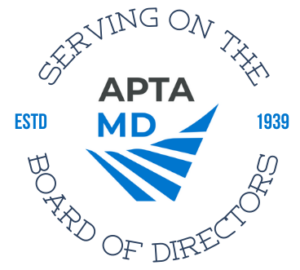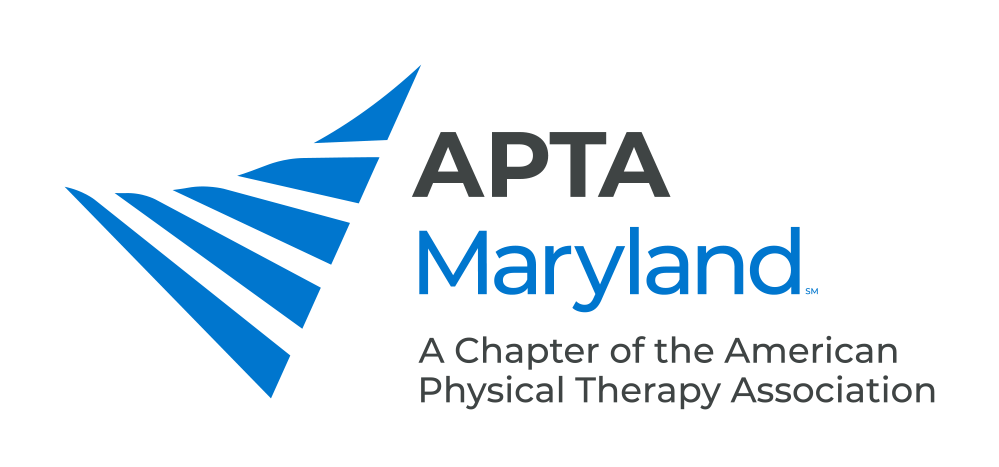Serving on the APTAMD Board of Directors
When running for a Board of Directors position for APTAMD, there are important considerations for members regarding the role, commitment and responsibilities involved. Therefore we have crafted important information to assist you in your decision-making process.
APTA Maryland is a non-profit, 501c6 organization governed by a Board of Directors and managed by an Executive Director. APTA Maryland is an independent organization but also a chapter of the American Physical Therapy Association.
Before committing to such service, you should familiarize yourself with how the organization is structured and understand its governance.

General Information
How much time commitment will this role need from me?
The APTAMD Board meets quarterly for a 90-minute video meeting. In addition, we hold a meet and greet at the Fall Annual Conference and summer social. The workload may fluctuate between months. We ask board members to read message updates, and files and connect through our workspace. This can be anywhere from 30minutes-2 hours.
What expectations are there for a Board member?
APTAMD Board members are expected to regularly attend Board meetings (including preparing for the meeting by reviewing the agenda and all related supporting documents), stay apprised of issues/needs of the organization, carry out the actions/follow up related to your role and the committees that report to your role. Directors are expected to contribute to organizational discussions to ensure the best decisions are made and be available to vote on time-sensitive and important business items. Board members are expected to have read all materials and to be fully prepared to discuss proposals and business agenda items prior to voting.
What type of information is presented and discussed at the Board level?
The APTAMD Board agenda includes strategic and operational discussion items. This may include updates on the status of the yearly goals for the strategic plan, committee reports, and a report on the chapter’s financial health with recommendations from the Finance Committee. The Board discusses organizational priorities to ensure the needs of the membership are met while also deciding how best to utilize its resources. The Board agenda is prepared by the Executive Director and Board President with input from all Directors. Board Directors are encouraged to submit discussion topics at least 2 weeks prior to each Board meeting.
How are the meetings managed?
The APTAMD Board President presides over all Board meetings and ensures the meetings are run by parliamentary procedure. The President facilitates productive business discussions and ensures meetings begin/end as scheduled. The Executive Director provides the full board with the meeting agenda and supporting materials to review at least 1 week prior to each monthly meeting. The Secretary records minutes (motions, votes) and provides a copy of the minutes to the Board and APTA within 1-3 days after the meeting.
What type of orientation is offered for new Board members?
New APTAMD Board members are invited to a virtual orientation meeting facilitated by the President and Executive Director via Zoom. Information is shared on the organization, relationship to APTA, committee/SIG structure, financials, programs, Board communication and resources available. The prior Board Director is also a resource for new Board members. Additional orientation and welcome meetings facilitated by the Board may be scheduled.
How does serving on the Board differ from serving on a Committee or Task Force?
While a Committee or SIG leader tends to be focused on the specific responsibilities to that project or function, a Board member must consider the broader needs of the organization. Board members work on the ‘big picture’ level instead of the focused work of a Task Force/Committee. Although the Board has specific board titles (i.e. Director of Research, Director of Education), each Board member has equal representation in voting power for all Board decisions. Board members also serve as Board Liaisons to committees/groups, they serve as a communication link between the committee/group and the Board. They provide guidance to committees to ensure that the committee’s planned work is in alignment with the organization’s mission, vision, and strategic plan. Board members also have a legal/fiduciary responsibility to the organization. This includes following laws, acting in good faith for business decisions, complying with conflict of interest policies, and ensuring the best interests of the organization
How is the Board kept apprised of important information?
It is important that the Board is kept up to date on organizational matters. The Board strives for open communication between Directors and also with the members they serve. Each Board member is asked to communicate pertinent information with each other as well as the Executive Office. The Executive Office also works to ensure the appropriate information is brought to the Board’s attention. All internal Board communications and electronic votes are conducted via our private workspace while email is reserved for calendar meeting invitations and external communication with members, partners, and other outside entities.
What type of experience should I have to serve on the APTAMD Board?
While there aren’t specific eligibility requirements to serve on our Board, skills and experiences provide an important framework for the role. At a core level, an engaged APTAMD member with a history of volunteer and leadership roles is essential. A Board member will need to have the organization’s best interests as their priority. Beyond this, prior experience working with others is key – experience on task forces, work groups, committees, or SIG groups. Knowledge of non-profit organizations and their governance is not required but helpful. Other valuable skills are strong communication, ability to think strategically, explore options, recommend action, implement initiatives, ability to collaborate with others
Fiduciary/Governance information
Board members have a fiduciary responsibility to the organization, what does this mean?
To serve on a Board is to take on some level of legal responsibilities in regards to the organization. The Directors take on ‘duty of care, loyalty, obedience’ in regards to their work in the name of the organization. Director’s actions must be consistent with laws and the best interest of the organization. In order to accomplish this role, Directors have expanded access to organizational information and staff resources.
Fiduciary Duty
Those in positions of responsibility and authority in the governance structure of an association—both volunteers who serve without compensation and employed staff—have a fiduciary duty to the organization, including duties of care, loyalty, and obedience. In short, this means they are required to act reasonably, prudently, and in the best interests of the organization; to avoid negligence and fraud; and to avoid conflicts of interest. In the event that the fiduciary duties of care, loyalty, or obedience are breached, the individual breaching the duty is potentially liable to the association for any damages caused to the association as a result of the breach. This fiduciary duty is a duty to the association as a whole; even those who only serve on a particular committee or task force owe the fiduciary obligation to the entire association.
- Duty of care. This duty is broad, requiring officers and directors to exercise ordinary and reasonable care in the performance of their duties, exhibiting honesty and good faith. Officers and directors must act in a manner which they believe to be in the best interests of the association, and with such care, including reasonable inquiry, as an ordinarily prudent person in a like position would use under similar circumstances. The “business judgment rule” protects officers and directors from personal liability for actions made in poor judgment as long as there is a reasonable basis to indicate that the action was undertaken with due care and in good faith.
- Duty of loyalty. This is a duty of faithfulness to the association. This means that officers and directors must give undivided allegiance to the association when making decisions affecting the association. In other words, officers and directors cannot put personal interests above the interests of the association. Personal interests may include outside business, professional, or financial interests; interests arising from involvement in other organizations; and interests of family members, among others. Officers and directors should be careful to disclose even potential conflicts of interest to the board of directors and should recuse themselves from deliberation and voting on matters in which they have personal interests. For pervasive and continuing conflicts, such as a director of the association concurrently serving on the board of a competing association, resignation from the individual’s association leadership post or from the outside conflicting responsibility may be required. Officers and directors can have business dealings with the association, but such transactions must be subject to considerable scrutiny. In such event, officers and directors must fully disclose any personal interests to the board of directors, and the terms of any transaction must be fair to the association.
- Duty of obedience. This duty requires officers and directors to act in accordance with APTAMD’s articles of incorporation, bylaws, and other governing documents, as well as all applicable laws and regulations.
What type of financial information is reported to the Board?
Financial oversight is an important part of the Board’s role. As such, the Board reviews, discusses and approves routine financial statements for the APTAMD. The Board and the Finance Committee have access to a directory of all balance statements, income statements and investment information year-round.
Serving on a Board of an organization you are committed to can be very rewarding. We hope you find this information helpful as you consider participating on the APTAMD Board.
Explore our full list of available positions and consider running! View eligibility requirements and the position descriptions here.
If you have any questions about elected board positions, please contact us.


